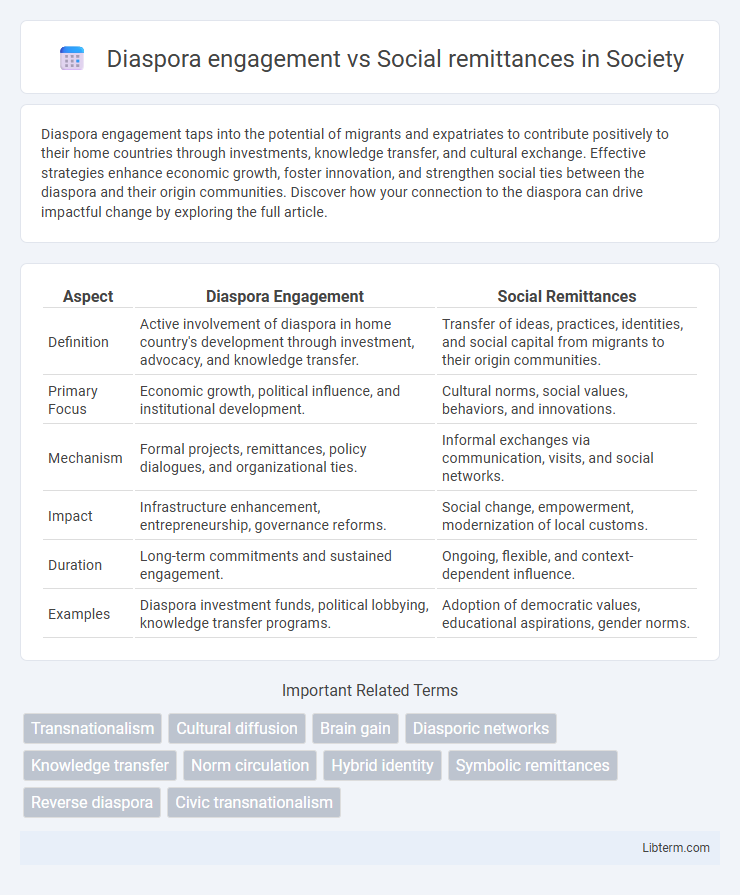Diaspora engagement taps into the potential of migrants and expatriates to contribute positively to their home countries through investments, knowledge transfer, and cultural exchange. Effective strategies enhance economic growth, foster innovation, and strengthen social ties between the diaspora and their origin communities. Discover how your connection to the diaspora can drive impactful change by exploring the full article.
Table of Comparison
| Aspect | Diaspora Engagement | Social Remittances |
|---|---|---|
| Definition | Active involvement of diaspora in home country's development through investment, advocacy, and knowledge transfer. | Transfer of ideas, practices, identities, and social capital from migrants to their origin communities. |
| Primary Focus | Economic growth, political influence, and institutional development. | Cultural norms, social values, behaviors, and innovations. |
| Mechanism | Formal projects, remittances, policy dialogues, and organizational ties. | Informal exchanges via communication, visits, and social networks. |
| Impact | Infrastructure enhancement, entrepreneurship, governance reforms. | Social change, empowerment, modernization of local customs. |
| Duration | Long-term commitments and sustained engagement. | Ongoing, flexible, and context-dependent influence. |
| Examples | Diaspora investment funds, political lobbying, knowledge transfer programs. | Adoption of democratic values, educational aspirations, gender norms. |
Understanding Diaspora Engagement
Diaspora engagement refers to strategic efforts by governments and organizations to harness the skills, investments, and networks of expatriate communities for national development. Unlike social remittances, which involve the transfer of ideas, practices, and social capital, diaspora engagement emphasizes economic contributions, policy influence, and institutional collaboration. Understanding diaspora engagement requires analyzing patterns of migration, diaspora policy frameworks, and mechanisms facilitating transnational linkages that drive sustainable development.
Defining Social Remittances
Social remittances refer to the transfer of ideas, behaviors, identities, and social capital from migrants to their communities of origin, influencing social norms and practices. Unlike financial remittances that involve monetary flows, social remittances encompass knowledge exchange, cultural values, and political attitudes that shape development processes. This concept highlights the non-economic impact of diaspora engagement, emphasizing the role of migrants in transforming social structures through intangible contributions.
Key Differences Between Diaspora Engagement and Social Remittances
Diaspora engagement refers to the strategic involvement of emigrants in their home country's development through investment, knowledge transfer, and political advocacy, whereas social remittances encompass the flow of ideas, behaviors, identities, and social capital transmitted from migrants to their origin communities. Key differences lie in diaspora engagement's emphasis on organized economic and institutional contributions, contrasting with social remittances' focus on intangible cultural and social influences. While diaspora engagement is often facilitated by formal networks and policy frameworks, social remittances operate through informal social interactions and everyday practices.
The Role of Culture in Social Remittances
Social remittances refer to the transfer of ideas, values, practices, and social capital from migrants to their home communities, deeply influenced by cultural factors that shape identity, norms, and behaviors. Diaspora engagement, while often focused on economic contributions such as remittances and investments, also encompasses the cultural exchange that reinforces transnational ties and social cohesion. Culture plays a pivotal role in social remittances by mediating how migrants adapt and transmit new social norms, impacting areas such as gender roles, education, and governance in origin societies.
Modes of Diaspora Engagement
Modes of diaspora engagement encompass economic investments, political participation, and social involvement, enabling diaspora communities to influence home country development through remittances, philanthropy, and knowledge transfer. Social remittances refer to the flow of ideas, behaviors, identities, and social capital exchanged between migrants and their home communities, shaping social change beyond financial contributions. Effective diaspora engagement strategies integrate both financial remittances and social remittances to foster sustainable development and transnational connectivity.
Impacts of Social Remittances on Home Communities
Social remittances, encompassing ideas, behaviors, identities, and social capital transferred by migrants, significantly influence home communities by reshaping social norms, cultural practices, and development perspectives. These intangible flows facilitate innovation, gender role shifts, and democratic participation, thereby complementing economic remittances and enhancing community resilience and social cohesion. Research indicates that social remittances contribute to improved education outcomes, health practices, and local governance, promoting sustainable development beyond financial capital injections.
Policy Approaches to Diaspora Engagement
Policy approaches to diaspora engagement emphasize fostering economic contributions, knowledge transfer, and political participation through institutional frameworks, investment incentives, and dual citizenship programs. Effective diaspora engagement strategies integrate remittance facilitation with diaspora skills utilization, enabling development-oriented social remittances such as cultural values, social norms, and civic practices to influence home country societies. Governments prioritize creating inclusive policies that balance economic integration and socio-political ties to maximize diaspora potential for sustainable development.
Measuring the Effects of Social Remittances
Measuring the effects of social remittances involves analyzing changes in cultural norms, social practices, and political behaviors transplanted by diaspora communities into their home countries. Quantitative indicators include shifts in local governance participation rates, adoption of new social attitudes, and transformations in gender roles influenced by diaspora interactions. Tracking these outcomes requires mixed-methods approaches combining surveys, ethnographic studies, and social network analysis to capture nuanced intra-community exchanges beyond mere financial flows.
Challenges in Leveraging Diaspora Engagement
Challenges in leveraging diaspora engagement include limited coordination between diaspora organizations and home country institutions, leading to fragmented efforts and reduced impact. Social remittances face obstacles such as cultural resistance, lack of trust, and difficulties in adapting new ideas to local contexts. Furthermore, inadequate infrastructure and legal frameworks in home countries hinder the effective transfer of skills, knowledge, and social capital from diaspora communities.
Future Directions in Diaspora and Social Remittance Research
Future research in diaspora engagement and social remittances should prioritize longitudinal studies to track the evolving impact of diaspora populations on home country development and cultural transformation. Emphasizing digital communication technologies offers insights into how virtual networks facilitate the exchange of ideas, skills, and social norms across borders. Expanding interdisciplinary approaches will enrich understanding of the multidimensional effects of remittances on socio-economic and political landscapes in origin communities.
Diaspora engagement Infographic

 libterm.com
libterm.com